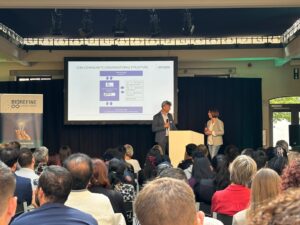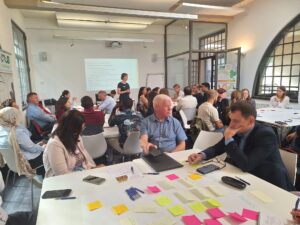ESNI paves the way of nutrient recycling
The European Sustainable Nutrient Initiative (ESNI) started in 2022 to counter nutrient imbalances and leaching from crops to environment that negatively affect human health, environment and economy.
Over the years, the European Union has adopted several actions, covering different levels of the food and feed value chain, to concretely pave the way for a more sustainable nutrient management. The recent revision of the Fertilising Products Regulation set the scene for an improved agricultural resource management to enhance recycling favour innovation and create stable market conditions for the use of alternative fertilisers.
In its fifth edition, the ESNI Conference, organised in the wider framework of the ESNI Community powered by the Biorefine Cluster Europe, proved that nutrient recovery and recycling can help develop a more efficient food and feed production system and protect the environment.
The conference began with an inspiring journey through the origin of the ESNI Community. Prof. Erik Meers from Ghent University shared the pivotal steps that led to the creation of this international network focused on promoting nutrient recycling.

The plenary sessions featured four high-level speeches providing different perspectives on the nutrient recycling and recovery. Updates on the European regulatory framework on nutrient recycling were discussed by Dr. Theodora Nikolakopoulou, DG GROW, who defined the pathway towards a harmonized rules set on making EU fertilisers products available on the market and facilitate their efficient use.
Laure Baillargeon, policy officer at DG GROW, outlined the importance of the role of biogas as key technology for nutrient recycling. During the ESNI Conference, the BIP – Biomethane Industrial Partnership – Task Force 5.2 report ‘Novel technologies and research needs for improving digestates valorisation’ was launched providing a review of the current EU legislation on digestate and its processing methods as well as identifying gaps in existing technology.
Inspiring and thought-provoking speeches opened the second day. Mauro Cordella from DG ENV drove the audience into the methods on the environmental footprint of fertilising products and the related recommendations adopted by the European Commission. Ludwig Hermann, Senior Business Advisor and CEO of Proman, gave a new perspective on the potential business opportunities for nutrient recycling in fertilisers as well as the added value of non-fertiliser use of biogenic waste materials.
Research and Innovation to enhance the nutrient management
9 parallel workshops co-organised by EU-funded projects, members of the Biorefine Cluster Europe, followed the plenary and addressed market drivers and

regulatory barriers in the market uptake and use of alternative fertilisers at regional, national and international level. Interactive discussions were centered on legal issues as well as economic incentives for nutrient recycling with the aim to collect useful information from stakeholders providing insights and practical experiences about regional case studies and barriers to adoption.
The debate around manure, sewage sludges, algae, and wastewater, among others, highlighted the importance of adapting regulations to support innovation and sustainability in the use of alternative fertilizers across different regions, which legislative framework make new business hard to emerge.
The ESNI Community: looking forward
Promoting a holistic approach to nutrient management transcending borders seems to be once again the key for a more sustainable nutrient management. The ESNI Community, part of the Biorefine Cluster Europe and supported by Ghent University and BETA Technological Center – UVIC, will keep advocating for a more integrated and sustainable nutrient management approach.
In the next months the ESNI Working Groups will be shaping their activities based on the insights of the conference, to gather inputs from the ongoing EU projects and translate them into actionable steps towards a more sustainable nutrient management practices.
If you are interested in following the ESNI Community, check our website and join our ESNI Working Groups to be at the forefront of nutrient recycling.